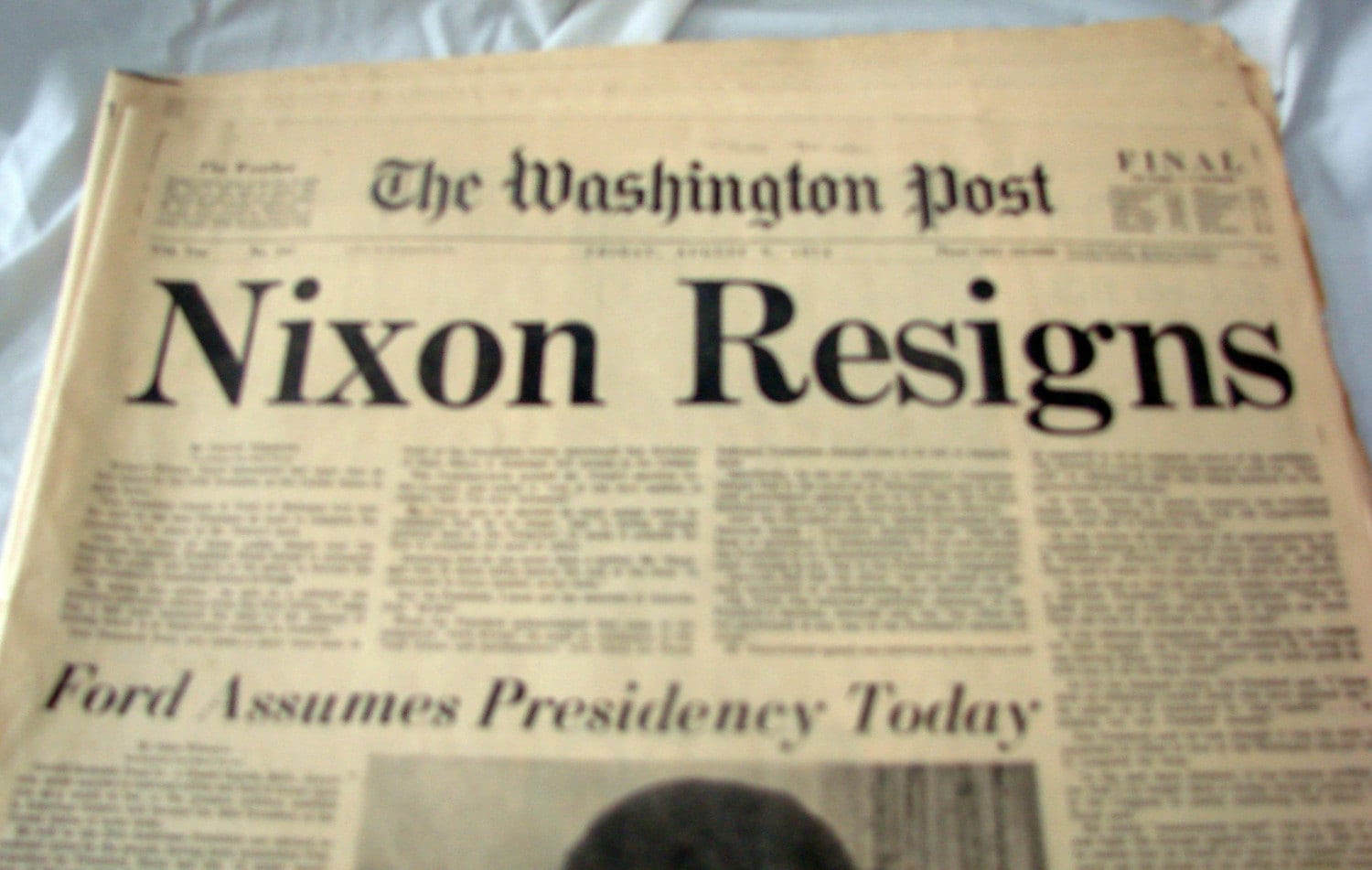Only we old fogies remember Watergate. I know because I was a history teacher and lucky if I made it to the end of World War II by the time the school year ran out.
Everyone knows it was a scandal of some sort and that it led to Richard Nixon's resignation. But right now is a very good time for a look back from 2016.
As you read on, keep in mind who the targets of the Wikileaks releases were: the Democratic National Committee and Clinton's campaign chairman John Podesta.
Watergate was the name of a hotel and office complex in Washington DC where the Democratic
National Committee (DNC) had its headquarters. On June 17, 1972, five men broke into the DNC offices there and were caught. The FBI discovered they'd been paid by the Committee for Re-election of the President (Nixon). Their purpose was to uncover the McGovern campaign strategies to defeat him in November.
Meanwhile, Nixon was re-elected in November with the electoral votes of 49 of the 50 states - a record blowout. As the story unraveled the following year, a bipartisan Congress investigated and discovered that the orders came from President Nixon's inner circle and that the President himself was likely responsible, finally securing the President's Oval Office tapes.
They also discovered that Nixon's campaign had been wire-tapping these same DNC offices since May, in addition to stealing campaign strategy materials in the burglary. It all unraveled in 1974 with Nixon's resignation.
What you need to keep in mind in this: Watergate was about the theft of campaign information by the GOP against the Democratic candidate.
I have had Watergate on my mind since the "duh" moment when I realized that the Wikileaks private emails stolen and publicized were from the Democratic National Committee (again) and from the Clinton campaign chairman, John Podesta. We haven't seen Wikileaks targeting people in the State Department or friends of the Clintons or international contacts. The targets are her party offices and campaign. All too familiar.
In 1972, it took wire-tapping and burglary to steal this information. Today, hacking does the trick.
The only remaining question is whether the Trump campaign -- and he himself -- is culpable. If we had a bipartisan Congress (which we haven't for some time) to investigate, it would be asking:
 1. Given that the US intelligence agencies are confident Russian hackers stole the information, what exactly is the Trump campaign's connection with Vladimir Putin?
1. Given that the US intelligence agencies are confident Russian hackers stole the information, what exactly is the Trump campaign's connection with Vladimir Putin?
2. Trump's top advisor, Roger Stone, bragged that he had a connection with Julian Assange of Wikileaks. What was that connection?
3. Have strategic campaign documents from those thefts been released directly to the Trump campaign?
I'm not sure how much closer the links to Watergate could be. What am I missing?
Everyone knows it was a scandal of some sort and that it led to Richard Nixon's resignation. But right now is a very good time for a look back from 2016.
As you read on, keep in mind who the targets of the Wikileaks releases were: the Democratic National Committee and Clinton's campaign chairman John Podesta.
Watergate was the name of a hotel and office complex in Washington DC where the Democratic
National Committee (DNC) had its headquarters. On June 17, 1972, five men broke into the DNC offices there and were caught. The FBI discovered they'd been paid by the Committee for Re-election of the President (Nixon). Their purpose was to uncover the McGovern campaign strategies to defeat him in November.
Meanwhile, Nixon was re-elected in November with the electoral votes of 49 of the 50 states - a record blowout. As the story unraveled the following year, a bipartisan Congress investigated and discovered that the orders came from President Nixon's inner circle and that the President himself was likely responsible, finally securing the President's Oval Office tapes.
They also discovered that Nixon's campaign had been wire-tapping these same DNC offices since May, in addition to stealing campaign strategy materials in the burglary. It all unraveled in 1974 with Nixon's resignation.
What you need to keep in mind in this: Watergate was about the theft of campaign information by the GOP against the Democratic candidate.
I have had Watergate on my mind since the "duh" moment when I realized that the Wikileaks private emails stolen and publicized were from the Democratic National Committee (again) and from the Clinton campaign chairman, John Podesta. We haven't seen Wikileaks targeting people in the State Department or friends of the Clintons or international contacts. The targets are her party offices and campaign. All too familiar.
In 1972, it took wire-tapping and burglary to steal this information. Today, hacking does the trick.
The only remaining question is whether the Trump campaign -- and he himself -- is culpable. If we had a bipartisan Congress (which we haven't for some time) to investigate, it would be asking:
2. Trump's top advisor, Roger Stone, bragged that he had a connection with Julian Assange of Wikileaks. What was that connection?
3. Have strategic campaign documents from those thefts been released directly to the Trump campaign?
I'm not sure how much closer the links to Watergate could be. What am I missing?


Good observation. The parallel had not occurred to me even though it is very straightforward. I don't think it has been discussed by others, either. This was a break in of a political campaign to find secrets to use for the purposes of the other campaign. It turns out that the most useful thing for the Trump campaign was not knowing the strategy but revealing the frank private interactions within the staff, since their unguarded conversations reveals comments on problems and weaknesses which sound like internal criticisms of their candidate. Trump calls it disloyalty within the staff.
ReplyDeleteGood post.
Peter Sage
Medford Oregon
www.peterwsage.blogspot.com
Thank you, Peter.
ReplyDelete